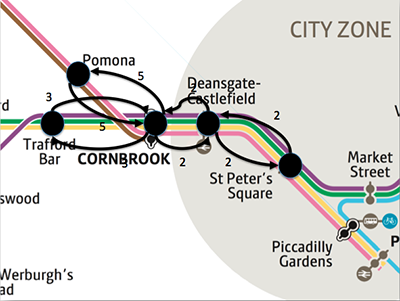Disclaimer: The statements and opinions expressed in this article are those of the author(s) and do not necessarily reflect the positions of Thoughtworks.

Road, Airline, Rail and Shipping networks rely heavily on geography, routing and optimisation. As such they are perfect examples for being able to benefit from Graph databases.
Tramchester: Public Transport App
Tramchester is a new public transport mobile web application for the Tram network in Manchester UK, built by the Thoughtworks Tech Lab in just six weeks.
The application models the tram network using a graph database. The graph database calculates the best route between two tram stations using a path finding algorithm. Users can select a preferred tram route based on nearest tram stop, departure and arrival time, number of connections and tram line. Once a tram route is selected it will give you detailed instructions of the journey.
Tramchester is built using publicly available data and open source technology and hosted in the cloud. The application was designed with a mobile first approach and built to be used on any mobile phone, computer or device with Internet access.
Why Graph Databases?
A graph database, is a type of NoSQL database that uses graph theory to store, map and query relationships. Graph databases are well-suited for analysing interconnections and working with data in business disciplines that involve complex relationships such as the travel and transport industry.

Graph databases excel at mapping physical locations against the various ways that one might get people or things to and from those locations. Built-in graph algorithms enable extremely fast execution of common problems, such as “shortest path.”
Benefits of Graph Databases
Thanks to co-authors Nima Montazeri, consultant, and Ben Earlam, senior consultant, for their contributions to this article.
Learn how to embrace change and move quickly to innovation using Agile Project Management methods.
Disclaimer: The statements and opinions expressed in this article are those of the author(s) and do not necessarily reflect the positions of Thoughtworks.
Thoughtworks acknowledges the Traditional Owners of the land where we work and live, and their continued connection to Country. We pay our respects to Elders past and present. Aboriginal and Torres Strait Islander peoples were the world's first scientists, technologists, engineers and mathematicians. We celebrate the stories, culture and traditions of Aboriginal and Torres Strait Islander Elders of all communities who also work and live on this land.
As a company, we invite Thoughtworkers to be actively engaged in advancing reconciliation and strengthen their solidarity with the First Peoples of Australia. Since 2019, we have been working with Reconciliation Australia to formalize our commitment and take meaningful action to advance reconciliation. We invite you to review our Reconciliation Action Plan.
